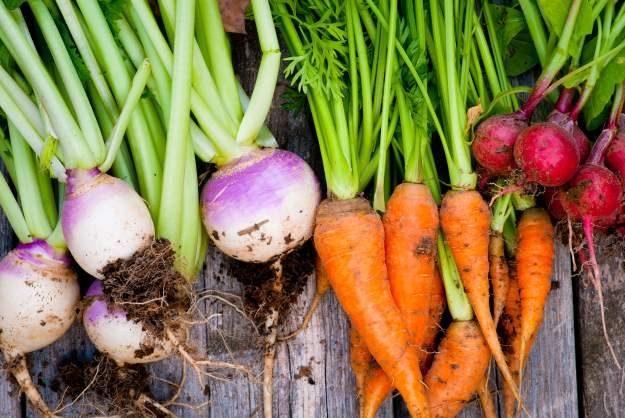Vegetable Gardening

Growing your own vegetables is a great way to get excited about adding new and tasty vegetables to your dinner table. So many people are becoming interested in growing their own produce that there are tons of exciting new vegetable varieties for home gardeners and lots of neat methods to try. Our gardening classes and resources will help you discover what methods are going to do best for us in Kansas.
Programs We Offer
Victory Garden 101, a series of free, online classes for Kansas gardeners. These were initially offered in April and May this spring, but the videos and class resources are still available online by clicking the link above.
Growing Growers ICT - An innovative farmer education program that provides new and experienced fruit and vegetable growers with fresh energy and new ideas.
Design & Grow Gardening Workshop - Offered early in the year, this workshop covers a wide variety of fruit and vegetable gardening topics.
Library Gardening Classes - These classes are typically held in the Spring and Fall as a joint project with the Wichita Public Library, and feature speakers from our Master Gardener volunteer program. Click here for current offerings.
Central Kansas Market Vegetable Growers Workshop & Regional Farmers Market Vendor Workshop - Held on a Saturday in early February each year, this workshop features speakers from successful fruit or vegetable operations and K-State specialists. Sessions vary and include growing methods, sales and marketing techniques, season extension, business management, and other related topics.
By Request - A wide variety of vegetable gardening topics are available to groups on request.
On Our Grounds
The Demonstration Garden on the west side of our building is home to a variety of vegetables, herbs, and some fruit. Our raised beds are made from a variety of materials. We also have an accessible gardening area that demonstrates techniques and garden bed options. The garden is also home to our composting area. Stop by any time to learn about what we are growing and our techniques.
FAQs
Why are the lower leaves on my tomato plants turning yellow and then dying?
Most likely this is caused by one or two very common fungal diseases – Septoria Leaf Spot and Early Blight. These diseases are not usually fatal, but can reduce the yields and fruit quality of your plants. There are some cultural practices that will help prevent or minimize these diseases, including mulching, caging or staking, and watering with drip irrigation. The following publication gives detailed information on controlling these diseases.
What can I do about spider mites in my garden?
Spider mites are probably the most difficult vegetable garden pest we deal with. Spider mites reproduce quickly during hot weather, so once you have identified them In your garden you will likely need to work to control them regularly until the weather cools down.
Options to Control Mites:
- Spray the entire plant, especially the undersides of the leaves, with a hard stream of water. Repeat every 4-7 days until you do not see new damage or live mites.
- Spray the entire plant, especially the undersides of the leaves, with neem oil, insecticidal soap (not dish soap!), or a horticultural oil. Repeat every 4-7 days until you do not see new damage or live mites.
- Sevin, Permethrin, and most other common garden pesticides are not recommended because they do not kill the mites and will kill the beneficial insects that help control the spider mite populations.
When can I plant my vegetables for a fall garden? What vegetables can I plant?
Fall garden vegetables are planted starting in late July for broccoli, cauliflower, cabbage, beets, and carrots through mid-September for spinach, radishes, and lettuce. Almost any cool season vegetables can be planted for a fall harvest, although potatoes and peas do not typically do well here in the fall due to warm soil temperatures.

